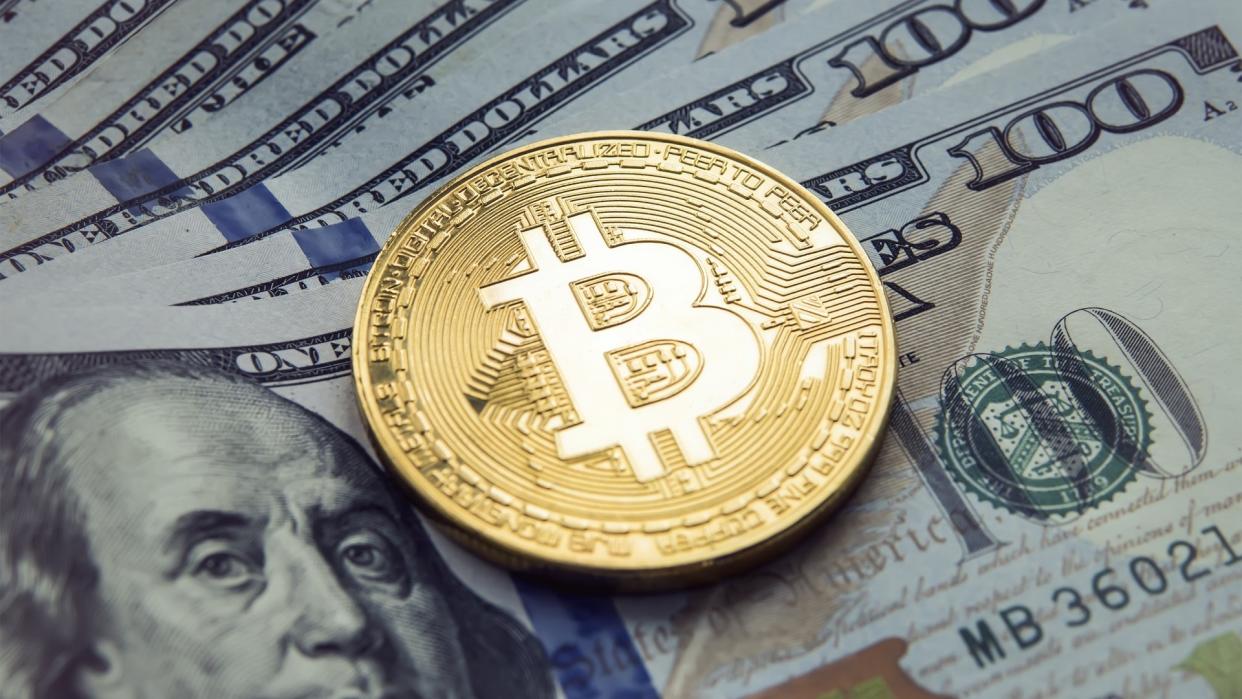Crypto vs. Cash: Is Crypto Real Money?

Ever since Bitcoin launched in 2008, following the release of the famous Bitcoin white paper that detailed this new technology and decentralized digital currency, cryptocurrency has taken investors on a wild ride. Bitcoin, the original cryptocurrency, gave rise to other coins, including ethereum, litecoin, dogecoin and more than 22,000 other altcoins.
Read: 3 Things You Must Do When Your Savings Reach $50,000
But is crypto “real” money? How does it compare to the U.S. dollar as a form of currency? And is crypto safe? Here’s an exploration of the similarities and differences between crypto and fiat currency, specifically the U.S. dollar.
What Is Cryptocurrency?
Cryptocurrency is a form of decentralized, virtual currency. That means you can’t hold a bitcoin in your hand; it is transferred only by digital means on a blockchain, with transactions verified by users.
Using crypto for transactions eliminates the need for a third-party payment processor, such as PayPal, Venmo, a bank or a credit card company. This helps make transactions secure and anonymous.
Legitimacy
Some people might consider crypto “real” money because you can use it for the exchange of goods, services or other currencies — including other crypto coins or even cash. For several years, U.S. banks have been discussing the possibility of considering bitcoin as a “legitimate asset class,” which means it would be recognized as real money.
However, bitcoin and other cryptocurrencies are not currently considered real money by the federal reserve or U.S. banks.
Crypto and Taxes: When Crypto Is Treated as Real Money
The IRS classifies crypto as a property or digital asset, which means you’ll pay capital gains taxes if you exchange your crypto at a profit. Most crypto transactions aren’t taxed until the crypto is cashed out and converted into U.S. dollars, exchanged for another coin or currency or used to make a purchase.
The IRS may tax crypto as income under certain circumstances. If you receive crypto as payment or through mining or staking activities, the government may tax your cryptocurrency at your marginal income tax rate.
If you traded, earned, bought or sold crypto in 2022, it’s wise to speak with a tax professional about how to declare your crypto earnings and losses on your state and federal tax returns.
Differences Between Crypto and U.S. Fiat Money
Cryptocurrency was created to be an alternative option to fiat currency. As such, they have significant differences.
Backing
Cryptocurrency is not backed by any assets, such as gold or silver — but neither is the U.S. dollar. However, the U.S. dollar is backed by the federal government. Cash money and crypto are different because crypto is decentralized and not backed by any government or institution.
Physical Assets
Crypto is also different from real money because it’s not tangible. You can’t hold bitcoin or ETH or any other altcoin in your hands.
Volatility and Use Cases
Finally, cryptocurrency also tends to be more volatile in the way it gains or loses value. Fiat currency has specific use cases — it’s used to make purchases of all kinds.
While some cryptocurrencies have use cases, like use on Web3 or stabilizing blockchains, many are worth only the value investors give them.
Similarities Between Crypto and U.S. Fiat Money
Crypto and U.S. money are similar in that they can both be used for the exchange of goods and services. In some cases, crypto income is taxed just like cash income.
Both dollars and crypto can be invested with the hope that the value will grow in the future.
Does Crypto Turn Into Real Money?
While cryptocurrency may or may not be recognized as a legitimate currency by the U.S. government in the future, it can be converted into U.S. dollars by selling it — either privately on the blockchain or through a crypto exchange — just as you can sell stocks or bonds.
Is Crypto Money Safe?
Cryptocurrency is notoriously volatile. While all investing comes with risk, crypto is very high risk.
Government Protection
Crypto can lose value quickly, while the U.S. dollar remains relatively stable over time. The Federal Reserve controls the money supply to prevent the U.S. dollar crashing and losing all its value.
No such protections exist with crypto, as exemplified by the ongoing crypto winter, which saw cryptocurrency as whole lose 65% of its value year-over-year between December 2021 and December 2022.
Blockchain Technology
In terms of security, cryptocurrencies cannot be counterfeited — unlike fiat currency — because of the blockchain technology they operate on. However, your crypto account can be hacked, resulting in a loss of funds.
It’s best to store your crypto offline in a cold wallet for maximum protection.
Insurance
While your money in a U.S. bank is protected up to $250,000 per account by the Federal Deposit Insurance Corporation, crypto is not protected by the U.S. government. If you’re using a crypto exchange, make sure the exchange has insurance against fraud.
Final Note
As crypto grows in popularity and adoption, it may be used more frequently for purchases. Right now, it is not recognized as real currency by the U.S. government. However, it can be used in the same way as U.S. fiat money in many circumstances.
This article originally appeared on GOBankingRates.com: Crypto vs. Cash: Is Crypto Real Money?
